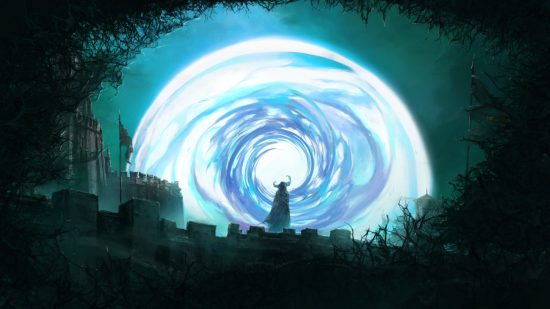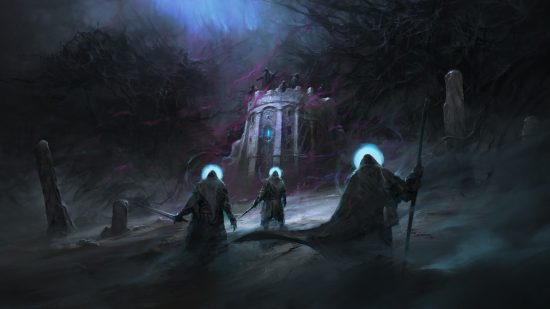Former Fallout 76 project lead Jeff Gardiner, who left Bethesda a year ago telling fans to “stay tuned” for what’s next, has now revealed that he’s founded a new games studio and that it’s working on a historical-fantasy RPG game called Wyrdsong. The teaser trailer debuted at Opening Night Live at Gamescom.
Gardiner’s new studio is called Something Wicked, and he’s brought together talent from Bethesda, BioWare, and Obsidian to shape its first game, Wyrdsong. The teaser trailer shows falling stars during a solar eclipse, and as the shot pans down, we see a knight wearing a Templar cross on his tabard, standing on a castle rampart.
Suddenly, the corona of the sun peeking out from around the moon closes like an eye, casting the scene into darkness. It reopens, blazing blue energy lighting a different version of the tableau: here the knight is replaced by a dark, horned figure, and thorny branches twist over the walls.
“Wyrdsong is a dark, preternatural or occult, historical fantasy,” Gardiner tells us. “It’s an open-world RPG set in middle ages Portugal. We want to ground the player in a reality that they’re sort of familiar with, because it’s from history, but at the same time introduce elements of fantasy as the player goes through it.”

Gardiner says the basic idea Wyrdsong is being designed around is that “the brain is not a passive receptor of information; you are a co-creator in your reality.”
“I’m really digging into this idea that’s in a lot of more modern fantasy and science fiction about multiverses and metaverses, and how these worlds interact and overlap with each other,” Gardiner says. “And there’s this ability for an individual to somehow gain knowledge of those worlds, and then be able to continue to live in this historical fantasy world and find some kind of power beyond that they can bring into the world with them.”
Gardiner says the inspiration for the setting came during his last vacation trip before the COVID-19 pandemic, when he and his wife traveled to Tomar, Portugal. It’s a small town just over 100 kilometres north of Lisbon, packed with 12th century castles and churches that display a range of architecture that includes Baroque, Manueline, Gothic, and Renaissance.
The town itself, Gardiner learned, was also planned as a headquarters for a branch of the Knights Templar, the mysterious order of religious warriors at the centre of countless conspiracy theories.
“We just sort of go places and rent little stick-shift cars and drive around,” Gardiner says. “I didn’t even realise how much the Knights Templar influenced the origin of Portugal as a nation-state, and that region as a whole.”
The Gardiners drove south to the town of Sintra, where they found another Templar stronghold – this one built over a set of ancient Celtic monoliths.
Throw in a local Masonic temple, and you’ve got a fully operational pitch for a new Dan Brown novel. Gardiner says that while a lot of the conspiracy theories surrounding these groups are pooh-poohed by proper historians, it makes for a wildly entertaining alt-history setting in a game.
“I wanted to dig into the idea that what these alternative history people are saying is actually true, and that the Templars were able to tap into some kind of alternative reality,” he tells us. “What would that look like in a role-playing game, where the player can experience this?”
Gardiner says an idea that tied in with this was the ‘unreliable narrator,’ and suggesting to the player that their own experiences in the game might not be real – or at least, not universally real.
There have been other influences Gardiner’s picked up along the way, too. He says he’s a big fan of Piranha Bytes Gothic RPG series, as well as the classic Ultima games (Ultima III and Ultima IV in particular). Another big influence, he says, is Robert Eggers 2015 movie The Witch, about a family of 17th century Puritans in New England who head out on their own to live in the wilderness and encounter a malevolent entity – or do they?
“You think these people are sort of going crazy, and they’re all in the woods together, and they’re feeding each other’s insanity,” Gardiner says. “And you find at the end, the head fake, is that this might have been real. You still don’t really know.”
Gardiner says he appreciated the research Eggers devoted to The Witch’s setting – the story was based on actual journals kept at that time by people in similar circumstances, grounding a supernatural story in a very real and believable setting.
Wyrdsong is still very early in its development, and so Gardiner isn’t ready to commit to a lot of the particulars about how the game will look or play – it’s not clear, for instance, whether this will be another first-person game, like the many RPGs he worked on at Bethesda. However, he’s putting together a team of seasoned genre vets to do it: Something Wicked includes folks like Charles Staples, who helped design Fallout: New Vegas, Alpha Protocol, and The Outer Worlds while working at Obsidian.
“I’m a big believer in attracting great folks who are really excited about working on a game like this, and giving them the autonomy to figure out how to make it,” Gardiner says. “What great ideas do you have, how can we fit them in? That magic was captured very successfully in my previous jobs, and I want to continue that at Something Wicked Games.”

